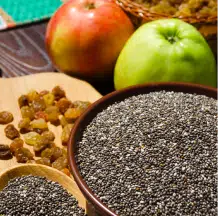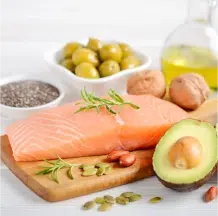Polycystic Ovary Syndrome, or PCOS, is a hormonal condition affecting millions of women worldwide – approximately 116 million women (3.4%) globally, according to the World Health Organization. It can cause irregular periods, difficulty with pregnancy, and symptoms such as acne, unwanted hair growth, and weight gain. But it’s possible to manage PCOS effectively with the right diet and nutrition.
What is PCOS?
Polycystic ovary syndrome, or PCOS, causes the ovaries to produce an excess of androgen hormones. This hormonal imbalance can lead to irregular periods and make it harder for women to get pregnant. PCOS is the most common cause of female infertility, as it can involve small cysts developing on the ovaries due to lack of ovulation. Up to 15% of women of reproductive age have some form of PCOS.
While the symptoms of PCOS can be challenging, they can also be effectively managed, and diet and nutrition play a key role in this process.


How Do You Treat PCOS?
When treating PCOS, doctors recommend focusing on symptoms most concerning to you, whether it be infertility, hirsutism, acne, or obesity. The two most significant ways to treat PCOS are changing your lifestyle or using prescribed medication. Most who have PCOS are concerned with weight loss, and losing even 10% of your body weight can make your periods regular again. Doctors recommend regular exercise, building a manageable routine, establishing a balanced diet, and considering combining lifestyle changes with medication.
Though low-carb and keto diets used to be known for controlling PCOS symptoms and providing weight loss assistance, the DASH diet has proven more effective.
DASH Diet & PCOS
The DASH (Dietary Approaches to Stop Hypertension) offers more benefits to women with PCOS because the diet helps reduce insulin levels, eliminate belly fat, and improve heart health.
A randomized controlled clinical trial conducted on 60 overweight or obese patients with PCOS showed promising results. After following the DASH diet for 12 weeks, participants experienced a significant decrease in BMI, anti-Müllerian hormone (AMH), insulin, insulin resistance, free androgen index (FAI), and oxidative stress marker malondialdehyde (MDA). At the same time, they saw an increase in insulin sensitivity and the sex hormone-binding globulin (SHBG), which helps regulate free testosterone levels in the body, and nitric oxide, which improves blood flow.
Adopting the DASH diet can transform your health, especially if you’re dealing with PCOS.
DASH Diet Foods For PCOS

Foods that are rich in potassium, calcium, magnesium, fiber, and protein

Vegetables, fruits, and whole-grains

Foods that are low in sodium and saturated fats

Fat-free of low-fat dairy products

Foods that do not have high saturated fats (like fatty meats and full-fat dairy products)
Can Nutrition Help My PCOS Infertility?
Many women who suffer from PCOS tend to struggle with infertility, and while IVF and fertility treatments assist in this department, proper dieting can improve the chances of fertilization. While dieting alone may not completely eliminate symptoms, there are a few tips and tricks that can provide some relief:
- Eating a bigger breakfast and smaller dinner
- Eat foods that are higher in protein
- Up your vegetable intake, especially with greens like broccoli or asparagus
- Eating primarily complex carbs – like whole grains and beans
- Consuming healthy fats and lean proteins to prevent blood sugar spikes

Anti-Inflammatory Diet
An anti-inflammatory diet can be a game-changer in managing PCOS. This diet helps reduce insulin levels and oxidative stress, and when combined with targeted medical treatment, it can help stabilize menstrual cycles in 63% of women. But remember, every woman’s journey with PCOS is unique. Not everyone needs or wants to use medications—it’s a personal choice. The good news? Even without medical treatment, an anti-inflammatory diet can offer substantial benefits, including improved PCOS symptoms and weight loss.
Here are some ways to effectively follow an anti-inflammatory diet:

Fill half your plate with fiber-rich fruits and vegetables.

Limit saturated fats – turn to fats like flaxseeds, olive oil, and nuts

Limit your red meat intake

Avoid having food and drinks that are high in sugar
How Can a Dietitian Help with PCOS?
When managing Polycystic Ovary Syndrome (PCOS), working with a registered dietitian can provide personalized guidance to help reduce symptoms, improve fertility, and balance hormones. After an initial assessment of your unique needs and goals, you and your dietitian will collaborate to create a meal plan tailored to your lifestyle. A dietitian specializing in PCOS is especially crucial because they understand the complexity of the condition and its various risk factors, ensuring these are considered when creating your dietary plan.
If you or a loved one is struggling with PCOS, contact Dietitian Group today to start your journey toward better PCOS symptom management.
